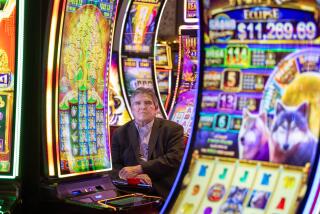Calabasas Firm Takes a Gamble on Riverboat Casino
Players International, a Calabasas company that offers discounts at casinos in Las Vegas and Atlantic City, is rolling the dice on what it hopes will be a profitable new venture: riverboat gambling.
Hungry for revenues, many Midwestern states have taken steps to legalize riverboat gambling. Three gambling ships have begun operating in Iowa. In Illinois last year the state passed a law providing for up to 20 casino boats, and has so far granted four preliminary licenses to companies planning to operate riverboat casinos.
In January, Players applied for a license to operate a riverboat casino on the Ohio River near the town of Metropolis in southern Illinois, which was a mecca for riverboat gambling in the 1800s. The Illinois Gaming Board, which regulates gambling in the state, hopes to announce a decision on Players’ application in August, said Donna Moore, chief legal counsel for the board.
If the license is granted, Players expects to have the boat running by the summer of 1992.
“If it happens and it’s successful, it’s going to be a major contributor to the company,” said David Fishman, Players’ vice chairman. “It’s a very profit-oriented business.”
For Players, a relatively small company in the high-stakes gaming business, the riverboat casino will be a big gamble, requiring an initial investment of about $13 million. Several million dollars will come from Players’ own cash and the rest will be financed, Fishman said.
Also, Players would have to pay a 20% tax on its riverboat gaming revenues to Illinois. However, unlike Iowa, Illinois has no limits on the size of bets or losses by any one gambler.
Saul Leonard, a Los Angeles gaming industry consultant, said the potential payoff of riverboat casinos remains uncertain and depends on factors such as how competitive the market becomes and how much business can be generated when the weather turns bad.
“I think the potential on any riverboat is relatively limited,” Leonard said. “That’s why you don’t see any major companies going into it.”
But Gregory H. Kieselmann, an analyst at the brokerage firm L. H. Friend, Weinress & Frankson in Irvine, said he expects the casino to be a “spectacular success” for Players. Kieselmann predicted that by fiscal 1993 the riverboat will generate about $30 million of the company’s $50 million revenue and push Players’ earnings to about $5 million. That compares to about $20.5 million in revenues with $1 million in profit projected by Kieselmann for fiscal 1991.
Kieselmann added that the riverboat casinos that recently began operating in Iowa are fully booked through September and have been receiving about seven times more phone calls on their reservation lines than initially projected.
To date, Players’ main business has involved selling memberships to a “club” that offers discounts of 25% or more on vacation packages at gambling spots. The Players Club--best known for its TV ads featuring actor Telly Savalas--has about 100,000 members who pay annual dues of $125. Players also operates casinos on two cruise ships and markets a line of cash advance machines used in casinos.
Players’ riverboat venture comes at a time when the company’s earnings have taken a downturn. In the fiscal third quarter ended Dec. 31, Players’ earnings declined 43% to $179,000 from $313,000 a year earlier, despite a 47% gain in revenues to $6 million.
The company blamed the lower profit largely on the costs of starting a new business that markets telephone call-in versions of the TV game shows “Jeopardy!” and “Wheel of Fortune.”
Players has not yet reported financial results for the fourth quarter ended March 31, but Fishman said the company was hurt during that quarter when the Persian Gulf War and the recession put a damper on consumers’ travel plans. Fishman said Players has since recovered from those problems and he expects earnings to rebound in fiscal 1992.
If the riverboat license is granted, Players would be the only operator of a riverboat casino within a 200-mile radius--an area that includes Southern Illinois and parts of Indiana, Kentucky, Tennessee, Missouri and Arkansas.
That region has a population of 6 million and would provide Players with a customer base of “middle rollers”--recreational gamblers who generally spend less than the “big rollers” that are courted by casinos in Las Vegas and Atlantic City, Fishman said.
Players plans to either lease or buy a new boat or retrofit an existing one, Fishman said. The boat would be patterned after the Mary Belle, one of the largest riverboats that plied the Ohio River near Metropolis in the late 1800s. It is expected to be 200 feet long with four decks and a capacity of 1,200 passengers. Customers would pay about $10 each to board.
The floating casino would have 500 slot machines and 25 tables for blackjack, craps, roulette and other games. It would also have a buffet, lounge and dance floor.
More to Read
Inside the business of entertainment
The Wide Shot brings you news, analysis and insights on everything from streaming wars to production — and what it all means for the future.
You may occasionally receive promotional content from the Los Angeles Times.











